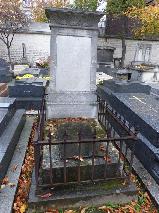Rumford, Benjamin Thompson, Count |
| SPY, SOLDIER, PHYSICIST (UNITED STATES OF AMERICA) |
|
BORN 26 Apr 1753, Woburn, Massachusetts - DIED 21 Aug 1814, Paris: Auteuil GRAVE LOCATION Paris: Auteuil Cimetière, Rue Claude Lorrain, Auteuil (division 05) |
|
Benjamin Thompson grew up in Woburn. He worked as an apprentice for a merchant in Salem and had other jobs. In 1772 he married the rich heiress Sarah Rolfe. They settled in Portsmouth, New Hampshire and he was appointed major in the New Hampshire Militia. During the American Revolution he sided with the loyalists. When his house was attacked he fled to the British troops, leaving his wife behind forever. He experimented with measuring the force of gunpowder, publishing his results in the Philosophical Transactions of the Royal Society in 1781. He was knighted by George III in 1784. In 1785 he moved to Bavaria to become aid-de-camp to Prince-Elector Charles Theodore. In 1789 he created the Englischer Garten in Munich. When he was knighted again in 1791 he chose the name Rumford, the old name for the town of Concord in New Hampshire. In 1798 he published "An Experimental Enquiry Concerning the Source of the Heat which is Excited by Friction". From 1799 onwards he lived in England and France. In London he suggested the foundation of the Royal Institution of Great Britain to Joseph Banks, the president of the Royal Society. The Royal Insitution was founded in 1800. His wife had died and in 1804 he married Marie-Anne Lavoisier, but they separated after three years. He spent his last years in Paris and he died there in 1814. Family • Wife: Paulze, Marie-Anne Pierrette (1804-) (divorce or separation) |
| Images |
Sources • Fischer, Manfred F., Ruhmeshalle und Bavaria, Bayerische Verwaltung der Staatlichen Schlösser, München, 1987 • Benjamin Thompson - Wikipedia (EN) |



